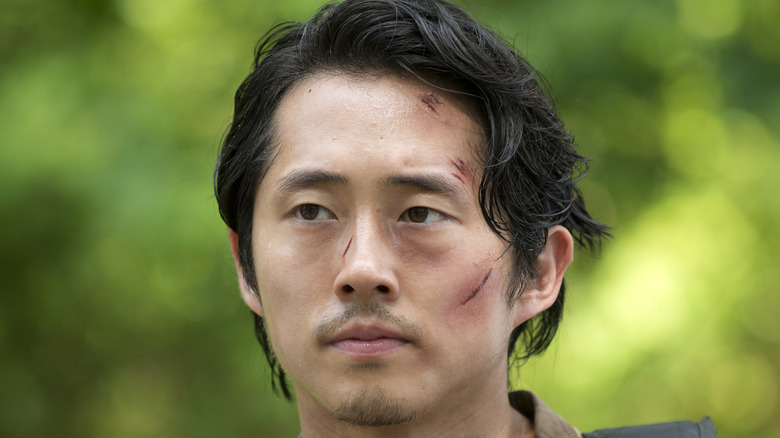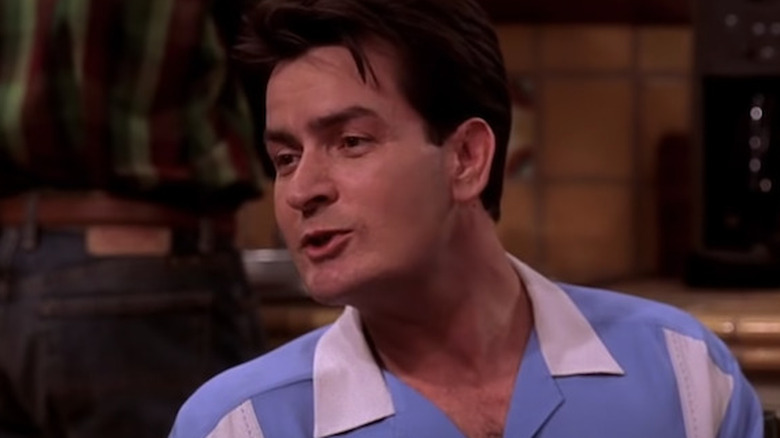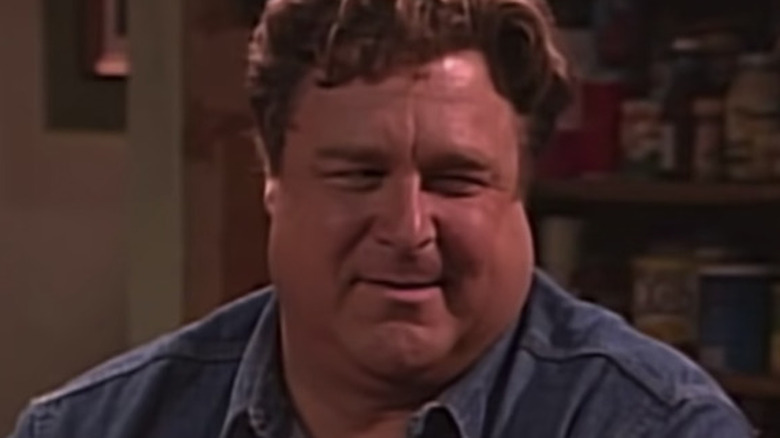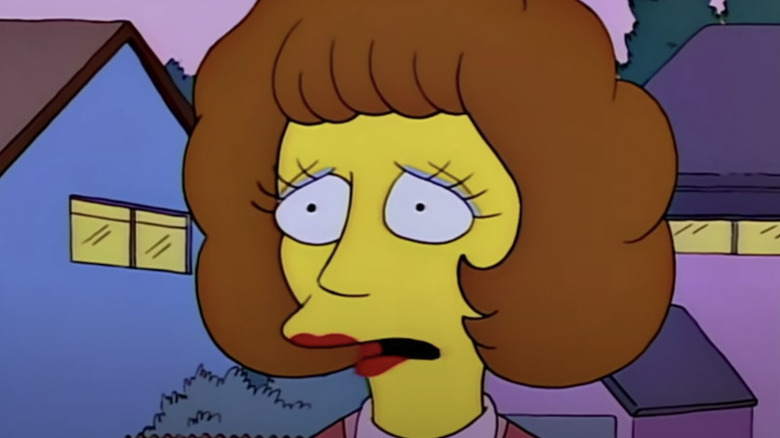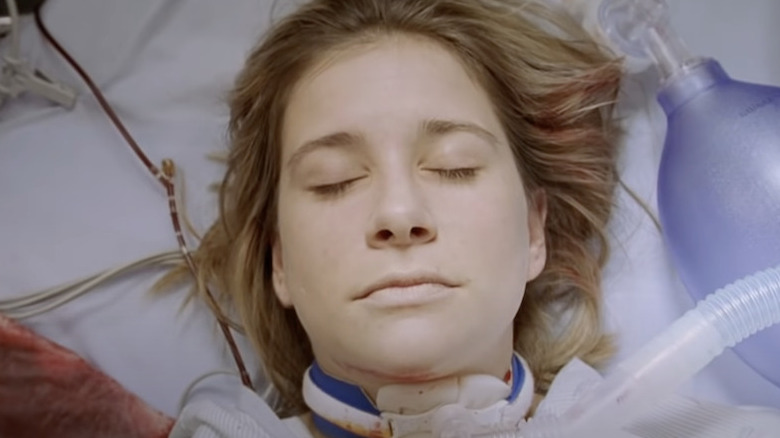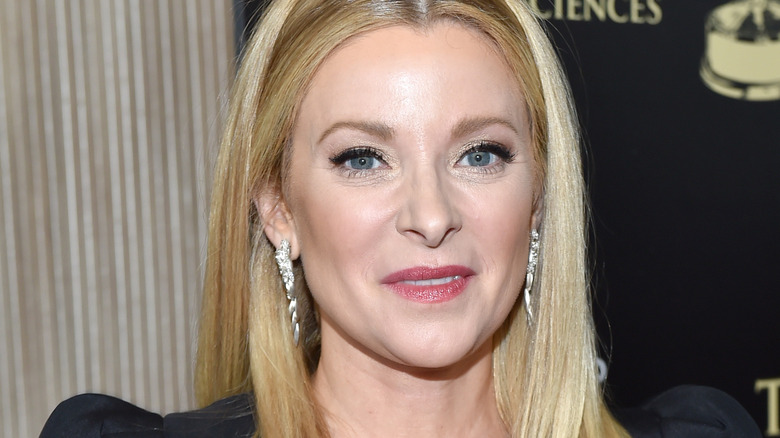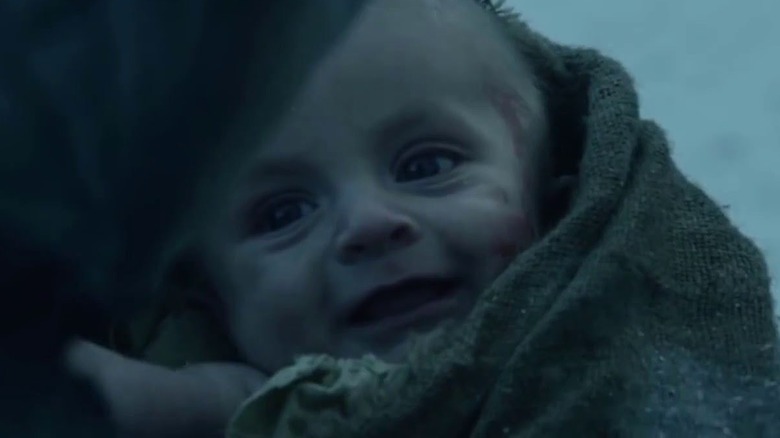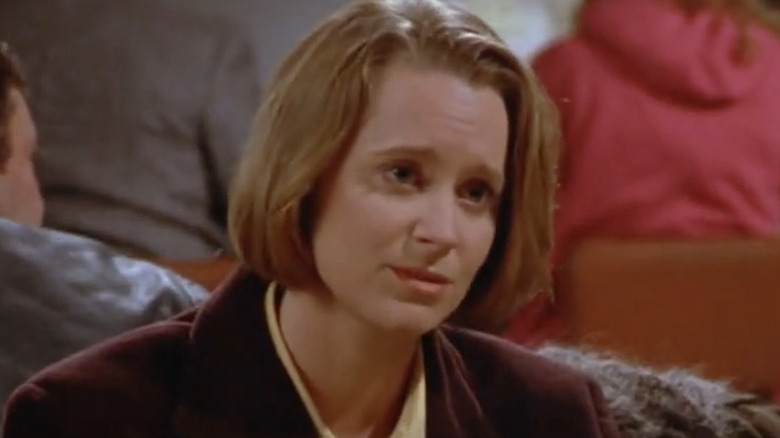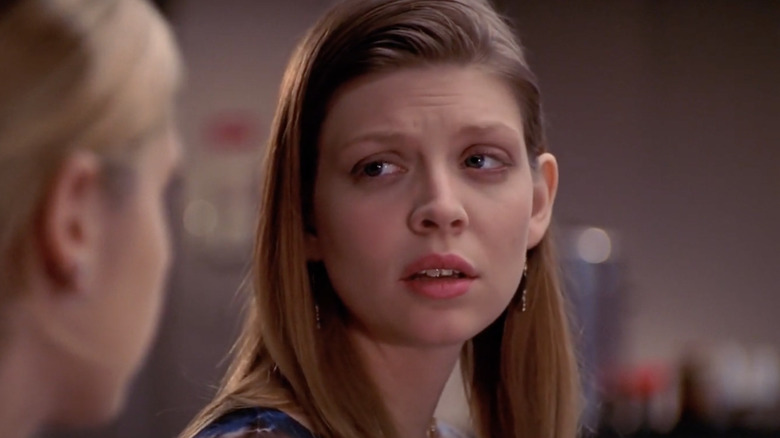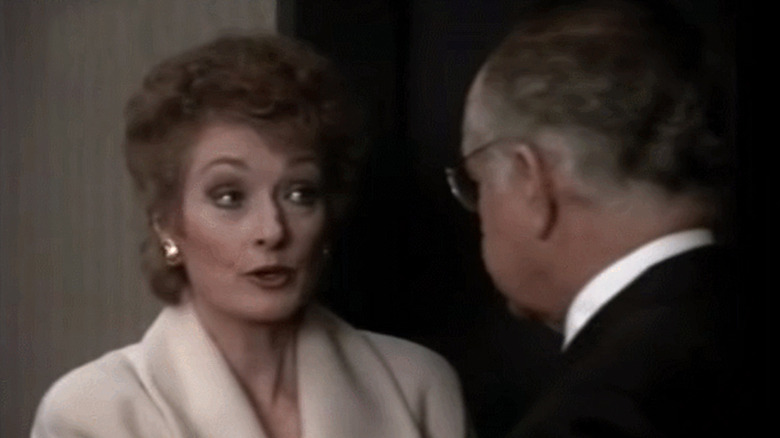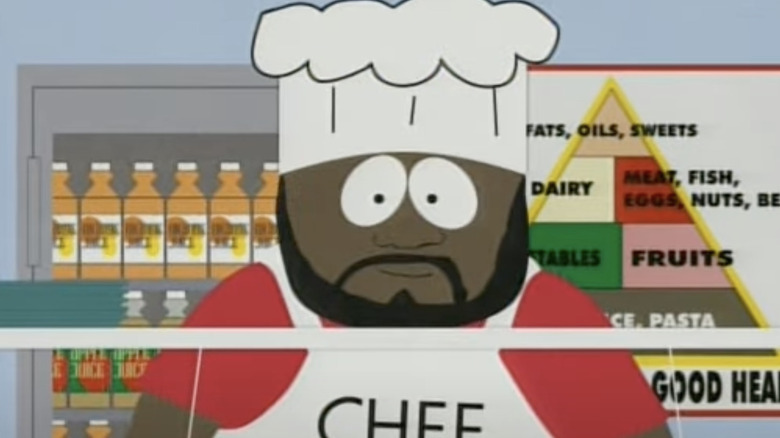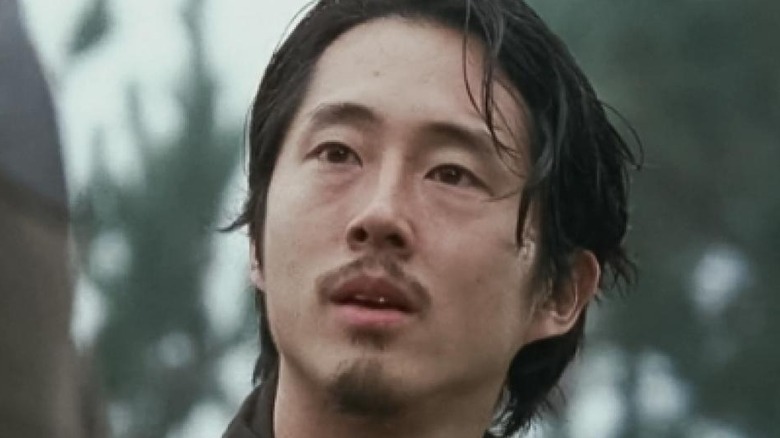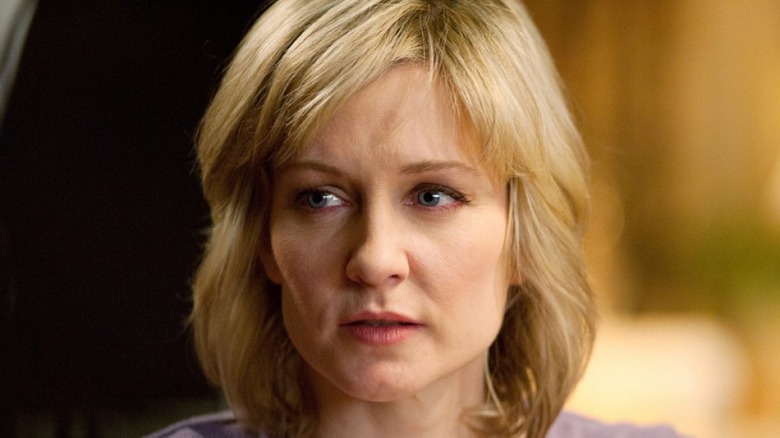Messed Up Ways Main Characters Were Killed Off
Death is a part of life, a certainty even, and knowing that it will eventually come can inspire us to get out there and start living to the hilt. Human mortality is such an overwhelming, agonizing, and complicated notion that it informs so much storytelling, including television. A death, be it slow to arrive or shocking and senseless, can make a compelling storyline for a drama, fantasy series, or even a comedy. To kill off a character is the ultimate in high-stakes plot development.
There are actually many reasons why the writers of a show would choose the possibly risky path of letting the proverbial axe fall onto the head of a beloved, main character: the actor might want to leave the show, they've been fired, or the showrunner might want to take things in a new direction. But no matter the why, it's always a big, emotionally-charged experience when a character dies, even if they go out in a dignified manner. Here are some particularly affecting (and effective) but utterly messy and cruel TV deaths that left other characters (or the audience itself) totally gutted.
Charlie on Two and a Half Men was crushed by a piano
"Two and a Half Men" was one of the most popular sitcoms of the 21st century, a status overshadowed by star Charlie Sheen's public exit from the series in 2011. After partying for days in Las Vegas, a stay in rehab, a production hiatus to accommodate Sheen's recovery, and Sheen delivering public rants about how his veins are filled with "tiger blood," and making nasty comments about "Two and a Half Men" creator Chuck Lorre, CBS fired the actor and replaced him with Ashton Kutcher.
When Lorre ended the comedy in 2015, he invited Sheen to come back for the final episode. In a post-credits title card message, Lorre explained that he'd asked Sheen to deliver "a maniacal rant about the dangers of drug abuse," but that he was immune because "he was a ninja warrior from Mars." Lorre added, "And then we would drop a piano on him. We thought it was funny. He didn't." Sheen declined the offer, but Lorre made sure that at least the actor's character appeared in the series finale. After other characters learn that Charlie Harper has died, an actor dressed up to look like Charlie Harper shows up, and a Sheen imitator announces that the death wasn't real. And then a piano falls, killing him instantly.
Dan Conner on Roseanne died from a secret off-screen heart attack
"Roseanne" was a smash hit upon its debut in 1988, partly because it captured the tone of comedian Roseanne Barr's act about being an overwhelmed, unsatisfied "domestic goddess" of a wife and mother in a blue-collar home. It also resonated with millions of Americans because it was the rare and relatable show about a Midwestern, cash-strapped family with realistic and messy problems. The breakout star of the show: John Goodman as Dan Conner, always-hustling husband to Barr's Roseanne Conner. In the ninth season of "Roseanne," the show became an entirely different thing — the Conners win the lottery, and behave like obnoxious rich people and engage in fantastical adventures, like fighting off train terrorists. But then in the last episode of the season, the 1997 series finale, "Roseanne" twisted again, with Roseanne Conner revealing that the entire lottery arc hadn't really happened, that it was part of a book she was writing to cope with a series of personal tragedies, including the death of Dan of a massive heart attack at the wedding of one of their daughters.
That shocking bummer of an ending posed a problem when ABC rebooted "Roseanne" in 2018. Writers decided to just ignore all of the events and revelations of the finale, including Dan's death. In the first episode of the revival series, Dan is rudely awakened by Roseanne, who feared he was dead. "Why does everybody always think I'm dead?" he quips.
Maude Flanders on The Simpsons was felled by a T-shirt cannon
Maggie Roswell was part of the extended voice cast of "The Simpsons" almost from the beginning. She can be heard portraying anonymous background characters in the fourth-ever episode of the decades-old series, and within a year, she'd introduce her major recurring characters: judgmental pastor's wife Helen Lovejoy, pious Simpsons neighbor Maude Flanders, Lisa's friend Janey Powell, and elementary school teacher Miss Hoover. Roswell worked on well over 100 "Simpsons" episodes until 1999, when some of her characters were recast and one of them was killed off.
In 1994, Roswell and her family moved away from Los Angeles, where "The Simpsons" is recorded, to Colorado, and she'd fly into California for recording sessions. "It was getting to be too much, too expensive, they wouldn't give me a raise, so I quit," Roswell told the Denver Post. The show responded by killing off her primary character, Maude Flanders, in an absurd and violent manner. In the 2000 episode "Alone Again, Natura-Diddly," the Simpson family attends a race at the Springfield Speedway and sits near the Flanders'. Homer desperately wants a cannon-fired T-shirt, and one is coming his way when he ducks. The shirt hits Maude, sending her flying off the grandstands to her death. "The cast was as shocked as I was," Roswell added. She returned to the show three years later, and records her vocals remotely — although Maude Flanders remains deceased.
Dr. Lucy Knight on ER died in a brutal attack to advance another character's story
During the sixth season of "ER," at that point an Emmy-winning, perpetually high-rated hit for NBC, executive producer John Wells decided to mix up the show's proven formula of intense hospital-based lifesaving (and soapy relationship issues of the doctors) with a transformation of the character Dr. John Carter, played since the beginning of the series in 1994 by Noah Wyle. Wells wanted to make the character into a drug addict. "I said that seems like a bit of a stretch for John Carter," Wyle told Entertainment Weekly, but Wells countered by explaining that "drug addiction is a ubiquitous problem that has not just a face, or any face — it has every face." The plan: Make Dr. Carter suffer a horrible, painful trauma that will make him descend into drugs as a way to cope.
Wells determined that the tragedy Dr. Carter would suffer would be the death of his girlfriend, Dr. Lucy Knight, portrayed by Kellie Martin. "They wanted to do something big for February sweeps, and Lucy was the character who got played out," Martin said. What followed was a gut-wrenching, extremely violent hour of television in which a patient suffering from a severe mental break attacks Drs. Carter and Knight. Both doctors suffer wounds, with Dr. Knight left to die in a pool of her own blood. She survives, gets a blood clot after a post-attack surgery, and then dies.
Dixie Cooney on All My Children ate tainted pancakes
Soap operas are a bastion of credibility-stretching premises and bizarre occurrences; they air five days a week, and the writers have to fill all those episodes with something. Daytime serials have featured things like a woman turning into a jaguar, an entire town faking their deaths, zombies, time travel, aliens, and evil twins, and the demise of an "All My Children" character in 2007 ranks among the all-time silliest soap plots.
Cady McClain co-starred as Dixie Cooney on the ageless ABC drama since 1989, and all was well until she got on the bad side of a staff writer she won't name. "I had stepped out of line and they wanted to put me back in line," McClain said on an Entertainment Weekly-sponsored cast reunion in 2020. The writer punished McClain by killing off her character, the death coming when Dixie chows down on a stack of banana pancakes she doesn't know are chock-full of poison. "I'll never live those pancakes down. It was a very strange way to go out," McClain said. The actor smoothed things over with the show, and she returned to "All My Children" in 2008 — as the ghost of Dixie Cooney, who later on was promoted to "alive" status.
Game of Thrones writers weren't hesitant to kill child characters
In most societies, children are almost universally considered to be innocents in the game of life — to be protected and shielded from the dangers of the world at all costs. That attitude extends to primetime TV, where kid characters are usually safe from harm and don't suffer the consequences of adult problems. But then "Game of Thrones," HBO's adaptation of George R.R. Martin's bestselling fantasy saga, came along and introduced a whole new era of TV where nobody was safe from a violent, callous, horrendous death — even characters well under the age of 18 or who didn't do anything wrong; such is the horrible, non-discriminating nature of war, like the ongoing one which informed the plot of the series.
Among the tough-to-endure deaths of faultless minors on "Game of Thrones" — a shrieking Shireen is sacrificed by her father, The Hound kills butcher boy Mycah on Joffrey's orders, Zalla is burned to death by the fiery breath of a dragon, a baby gets turned into a zombie-like White Walker, and Stark family heir, baby Eddard, is slaughtered while still growing in his mother's womb.
Susan on Seinfeld licked too many toxic envelopes
While often described as a "show about nothing," because it focused on the minutiae of daily life and relationships, "Seinfeld" was really a show about cruel and cold people. That thesis was decisively proven by the show's 1998 finale, which found all four main characters — Jerry, George, Kramer, and Elaine — imprisoned for failing to adhere to a Good Samaritan law, following testimony to their awfulness by a number of past "Seinfeld" figures. The hilariously nasty "Seinfeld" could also be exemplified by the 1996 episode "The Invitations." George (Jason Alexander) is planning his wedding to fiancée Susan Ross (Heidi Swedberg), whom he doesn't really like or want to marry. He's saved from walking down the aisle when Susan dies after ingesting a deadly amount of glue from licking dirt-cheap wedding invitation envelopes — which George had selected.
Susan's send-off was callous enough, and it reflected some behind-the-scenes attitudes toward the actor who played the role. "I couldn't figure out how to play off of her," Alexander told "The Howard Stern Show" (via The Hollywood Reporter). "Her instincts for doing a scene, where the comedy was, and mine were always misfiring." Alexander added that costar Julia Louis-Dreyfus (Elaine) agreed with him about Swedberg, casually darkly joking one day, "Don't you wanna just kill her?" Those feelings gave co-creator Larry David the idea to actually kill off Susan.
Tara on Buffy the Vampire Slayer was killed by a stray bullet
"Buffy the Vampire Slayer" trafficked heavily in death, following a supernaturally gifted vampire killer, who protects the world from the undead monsters emerging from the Hellmouth underneath her hometown. With the bloodsuckers, ancient demons, and a dead-then-alive Buffy roaming around, death wasn't always an absolute on "Buffy the Vampire Slayer," but it was treated as such when it came through very human means. In the 2002 Season 6 episode "Seeing Red," Warren Mears (Adam Busch) conspires with two friends to harness evil powers and kill Buffy. His plans go awry and he resorts to threatening Buffy in her backyard with a gun. A stray bullet goes into Buffy's house, where it strikes Tara (Amber Benson), the girlfriend and true love of powerful witch Willow (Alyson Hannigan), the death turning her into a dark vessel of violence and revenge; she brutally kills Warren, for example.
The death of Tara was seemingly random and unnecessary. "There were parts of season six where I feel we went too far," showrunner Marti Noxon told Vulture in 2018. "And I think that killing Tara was — in retrospect, of all the people, did she have to die?" In a cruel extra bit, show creator Joss Whedon added Benson to the main title credits for the first time with that episode, only to kill off her character.
Rosalind Shays on L.A. Law plummeted down an elevator shaft
What "Miami Vice" did for police procedurals in the '80s, "L.A. Law" did for courtroom shows, showcasing the legal dealings of a group of romantically-entangled attorneys in sexy, sun-kissed Southern California. Not only a popular hit, "L.A. Law" earned acclaim, winning outstanding drama series at the Emmy Awards four times during its 1986 to 1994 run. Nearly the entire cast was recognized by the Emmys at some point, too, including Diana Muldaur, who earned two nominations for outstanding supporting actress in a drama series for her portrayal of Rosalind Shays, a nasty villain and agent of chaos who antagonized most everyone on staff at the McKenzie, Brackman, Chaney and Kuzak firm.
But bad people never last long on soaps like "L.A. Law" — they eventually meet their comeuppance in some fashion. In the prophetically titled 1991 episode "Good to the Last Drop," Rosalind has a minor squabble with boyfriend Leland McKenzie (Richard Dysart) and turns to walk into an elevator after hearing the "ding" and its doors opening. However, the elevator cab isn't there, sending Rosalind plunging down an empty shaft, dying upon impact with the ground many stories below.
Gary on Thirtysomething died in an ill-timed accident
Debuting on ABC in 1987 and immediately causing a stir, the drama "Thirtysomething" represented something new and groundbreaking on TV — a show about young, attractive, wealthy "Yuppies," all of whom lived in Philadelphia and mentally wrung their hands about their life choices and constant dissatisfaction with adulthood. "thirtysomething" became a cultural phenomenon, inspired numerous think pieces, and won the Emmy Award for outstanding drama series in 1988, among other top TV prizes. Patricia Wettig won three Emmys for her work as Nancy Krieger-Weston, a character with a lot going on — her husband cheats on her, she gets a divorce, she becomes a successful children's book illustrator and art teacher, endures an agonizing struggle with cancer, and becomes close to sweet, kind, fellow teacher Gary Shepherd (Peter Horton).
Another way "Thirtysomething" was something different: It suddenly killed off a main character on an episode in 1991 — a time when TV shows, particularly broadcast TV shows, didn't do that unless an actor wanted to leave the show or they died in real life. This death packed some emotional wallop, too. After Nancy has surgery and learns that she's cancer-free, Gary drives to the hospital to visit her, but gets in a fatal car accident on the way. Nancy receives the gift he had planned to give her: a copy of one of her favorite books in which he'd written a beautiful inscription.
Chef on South Park dies in a series of horrors
Premiering on Comedy Central in 1997, "South Park" was an instant hit and a true original, featuring four foul-mouthed kids living in a bizarre Colorado mountain town where the voice of maturity was Chef, a libidinous school cafeteria cook and soul singer voiced by music legend Isaac Hayes, best known for his Oscar-winning 1971 smash "Theme from Shaft."
Over its long run, "South Park" creators Trey Parker and Matt Stone have satirized multiple religions. But when they took on the Church of Scientology in the 2005 episode "Trapped in the Closet," that was a step too far for Hayes, an adherent of that faith system. "There is a place in this world for satire, but there is a time when satire ends and intolerance and bigotry towards religious beliefs of others begins," Hayes said in a statement in which he also announced he was leaving "South Park."
Without Hayes, "South Park" got rid of Chef, too. In the 2006 episode "The Return of Chef," the kids welcome the character back to town after his travels with the Super Adventure Club. After noticing Chef's strange voice (compiled with awkwardly pieced together archival clips), the children find out that he's been brainwashed by a cult. Then he dies in a series of mishaps: Chef becomes engulfed in flames, falls off a bridge, lands on sharp rocks, gets impaled on a branch, and is eaten by a bear and a lion.
Glenn met a barbed-wire bat on The Walking Dead
Ostensibly a show about the wandering survivors in a post-zombie apocalypse world, "The Walking Dead" turned into a star vehicle for actor Jeffrey Dean Morgan when he joined the cast in 2016 as Negan. The most notorious villain from Robert Kirkman's "Walking Dead" comics, Negan was unrelentingly cruel, using a barbed wire-wrapped bat named Lucille to randomly kill members of survivor groups he encountered.
The introduction of Negan occurred not long after a viewer-manipulating trick. In the 2015 episode "Thank You," Glenn (Steven Yeun) and fellow survivor Nicholas (Michael Traynor) get surrounded by zombies and take refuge atop a trash bin. Nicholas, tired of running, shoots himself in the head, falling to the horde of zombies... and Glenn plummeting, too. Glenn is shown screaming as the walkers approach, and his name was left out of the credits in the next episode. But, surprise: Glenn didn't die. He emerges a few episodes later unscathed, having hidden under the dumpster while the zombies ate Nicholas.
Glenn was among the possibilities of who would meet the business end of Lucille. The Season 6 finale of "The Walking Dead" cut to black while the soundtrack played the disgusting sounds of Lucille tearing a human head apart. Viewers had to wait months, until Season 7, to find out — and watch — Negan murder Glenn and Abraham (Michael Cudlitz). All that machination had a negative effect on "The Walking Dead" — viewership dropped by nearly half in weeks, and never recovered.
Linda took a fateful helicopter flight on Blue Bloods
On a show like "Blue Bloods," playing a core character offers a certain amount of job security — but as long-running television dramas wear on, it's often necessary to ramp up the dramatic stakes by jolting viewers with an unexpected death. It's an occupational hazard that actors have to accept when they sign on for a series, but those who are lucky enough to attain veteran status have the right to hope their character's given a dignified — or at least impactful — demise.
That didn't really pan out for Amy Carlson, who played Linda Reagan on "Blue Bloods" for seven seasons ... and then vanished between Seasons 7 and 8. Viewers were understandably chagrined when they belatedly learned that Linda died offscreen, a fatality in a helicopter crash that occurred while she was in the line of duty as an ER nurse — and Carlson was apparently less than pleased as well. Although she issued a standard "thanks for the memories"-style farewell after Linda's death was revealed, she later hinted that she may have left under less-than-happy circumstances.
"It's standard to have conversations with actors whose contracts are up prior to the season ending. It's not that you start to shoot and don't know," Carlson told Deadline. "I never wanted it to end that way."
